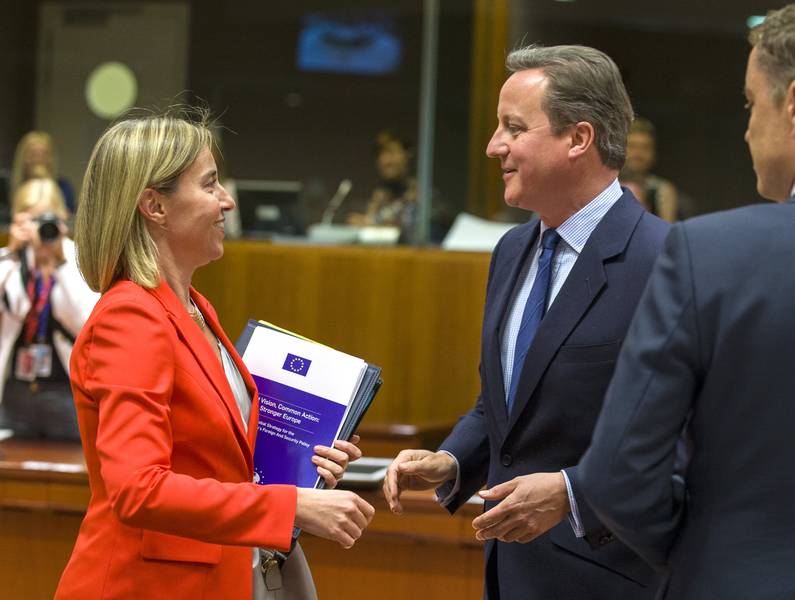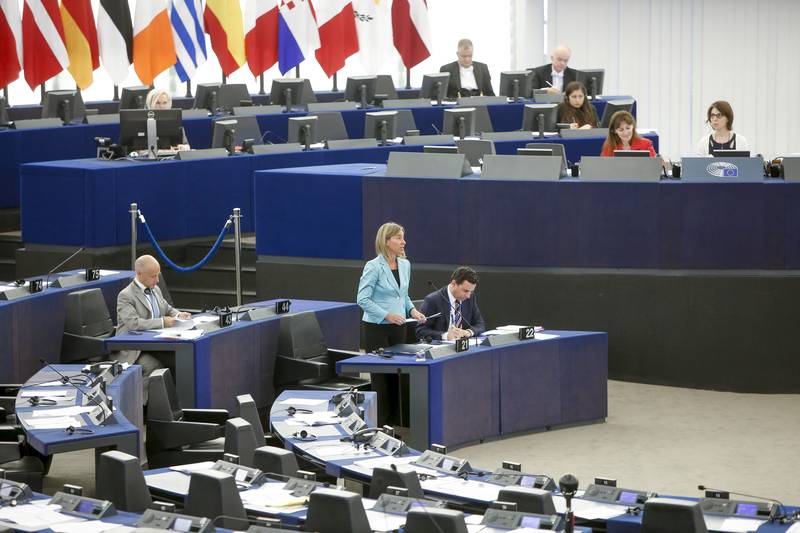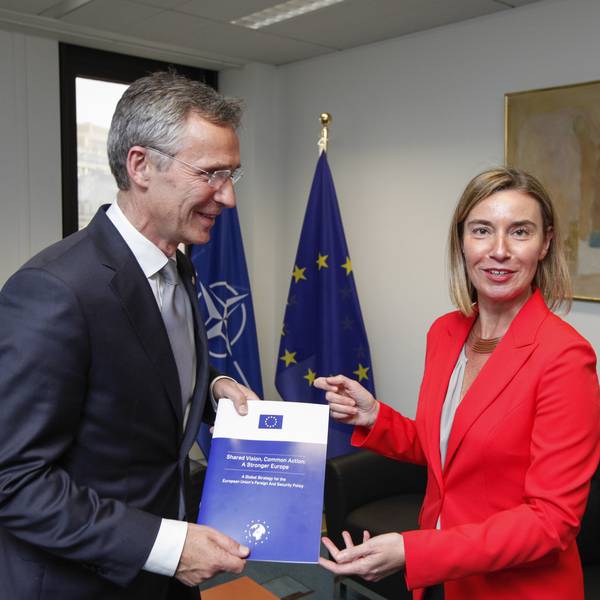The New EU Security Strategy Reveals Internal and External Insecurity
Adelina Marini, July 29, 2016
 An important piece of news with a long-term horizon did not manage to push through the flood of short-term solutions that the EU is fully occupied with at the moment. There could hardly be any worse timing for the presentation of the long-awaited global strategy of the EU by High Representative of the European Union for Foreign Affairs and Security Policy Federica Mogherini (Italy, Socialists and Democrats). The document, whose aim is to inherit the strategy by one of Ms Mogherini’s predecessors, Javier Solana, from 2003, was presented for the first time at the June EU summit, when the Union was fully immersed in the results of the British referendum of June 23 and the questions about the Union’s future that it bred. The document was met lukewarm by the leaders and it did not come to getting an approval. The discussion on it at the meeting of foreign ministers last week was also pushed aside – this time by the coup attempt in Turkey. The debate in the European Parliament was unexpectedly lifeless.
An important piece of news with a long-term horizon did not manage to push through the flood of short-term solutions that the EU is fully occupied with at the moment. There could hardly be any worse timing for the presentation of the long-awaited global strategy of the EU by High Representative of the European Union for Foreign Affairs and Security Policy Federica Mogherini (Italy, Socialists and Democrats). The document, whose aim is to inherit the strategy by one of Ms Mogherini’s predecessors, Javier Solana, from 2003, was presented for the first time at the June EU summit, when the Union was fully immersed in the results of the British referendum of June 23 and the questions about the Union’s future that it bred. The document was met lukewarm by the leaders and it did not come to getting an approval. The discussion on it at the meeting of foreign ministers last week was also pushed aside – this time by the coup attempt in Turkey. The debate in the European Parliament was unexpectedly lifeless.
The world and the EU in particular has changed significantly over the last 13 years since Mr Solana’s strategy was published, although some goals remain valid today. The most pronounced change is evident in the Union itself. When Javier Solana’s strategy was published in December 2003, the EU had still not gone through the major enlargements of 2004, 2007, and 2013, the euro area crisis was still far away, Euroscepticism was a funny political eccentricity, Russia had still not turned into a threat to the Union, and the long-standing conflicts in the Middle East looked like a constant in foreign policy for centuries to come.
Thus, the introduction to the strategy took into account that “Europe has never been so prosperous, so secure nor so free”. Moreover, the introduction of the document also pointed out that “the violence of the first half of the 20th century has given way to a period of peace and stability unprecedented in European history”. There was only the shadow of terrorism hanging above the Union after September 11, 2001 and it was exactly this that was outlined as one of the largest threats to the EU in the previous strategy, adding to state failure, organised crime, and corruption.
From integration to keeping the EU intact
Federica Mogherini’s strategy starts with a very different and, alas, not as positive assessment of the state of the Union after the exhausting euro area crisis, which inflamed Euroscepticism and turned it into a major political force, after the disappointment with enlargement, which brought mass internal migration towards the richer member states and ended sadly with the decision for Brexit. The strategy comes after the annexation of the Crimea by Russia, after the ignition of new and broader wars in the Middle East, and after the mass torrents of refugees from various conflict hotspots worldwide. In spite of all these circumstances, no one cares about the strategy, neither does it offer solutions that are acceptable at this stage. “In a more complex world, we must stand united”, urges the strategy in its introduction in a desperate attempt at convincing exactly the European public that only in its entirety could the Union face the multitude of problems surrounding it.
A large part of the document is aimed at what does the EU need to be in order to turn outward and be capable of facing the challenges. Aside from mentioning several times the necessity that the EU preserves its integrity, the strategy contains is a special section dedicated on the idea that in order to pull weight on the international arena the EU needs to be credible. “The EU’s credibility hinges on our unity, on our many achievements, our enduring power of attraction, the effectiveness and consistency of our policies, and adherence to our values”, says the strategy. This exposes one of the most pronounced differences with the times of the previous strategy. “Over this period, the progressive spread of the rule of law and democracy has seen authoritarian  regimes change into secure, stable and dynamic democracies. Successive enlargements are making a reality of the vision of a united and peaceful continent”.
regimes change into secure, stable and dynamic democracies. Successive enlargements are making a reality of the vision of a united and peaceful continent”.
13 years later it is exactly the countries, which were pulling off the chains of authoritarianism with a bang less than 30 years ago, who started to see its good sides. Sympathy for illiberalism is blooming both within the Union and around it, most of all in the last batch of countries, waiting to join a more and more insecure Union. Ms Mogherini’s strategy in this sense admits this weakness and states intention to fight it. “The EU will foster the resilience of its democracies, and live up to the values that have inspired its creation and development. These include respect for and promotion of human rights, fundamental freedoms and the rule of law. They encompass justice, solidarity, equality, non-discrimination, pluralism, and respect for diversity”. This is one of the biggest pluses of the considerably larger document of Federica Mogherini.
Applause is also due to the fact that, despite the difficult situation that the Union is in at the moment, it does not back down on enlargement. To the EU, this continues to be an investment in European security and prosperity. It is disappointing that there is so little attention paid to this policy, considering the now plentiful experience gained over the last decade and whether it needs rethinking of the current membership criteria or approach. The strategy speaks of the need enlargement policy to continue to be based on strict and fair conditions, whose goal is to modernise and democratise, but does not account for the powerful geopolitical shifts, which have very serious impact on candidate countries. The document is too general and does not mention individual states, which need to be worked with more and on more levels, such as Turkey. Neither does it take into account the ever dropping support for enlargement. There is much more thought now about exiting in the EU than about enlargement.
Emancipating from NATO?
The boldest and unrealistic (at this stage) idea in Ms Mogherini’s strategy is the attempt to emancipate from NATO. The idea is far from new. It is included in the EC boss Jean-Claude Juncker's agenda (Luxembourg, EPP). Sadly, it is not fully developed in the strategy, possibly exactly because of the lack of appetites for more integration, and furthermore this idea falls into the conflict of EU vs. NATO, making member states not particularly keen on it, for most of them, being both in the EU and NATO, see this as an overlapping of priorities. According to the document, the EU needs to take larger responsibility of its own security and be capable of restraining, responding, and defending from external threats, and NATO protects only those countries which are its members. Most of them are European countries. Several EU members, however, are not members of the pact. Europeans need to be better equipped, trained, and organised to react autonomously when needed, believe the authors of the strategy.
"At the same time, EU-NATO relations shall not prejudice the security and defence policy of those Members which are not in NATO". The strategy suggests member states be bolder in the synchronisation and unification of their national defence, it urges them to throw more money into defence, and make maximum use of the European funds for scientific research and development, as well as create a common defence market. According to a source from the European External Action Service, whom euinside spoke to, this swerve towards a future European army is due to the main engine of the strategy – Federica Mogherini’s adviser Nathalie Tocci, who has clearly visible Euro-Atlantic views.
The strong ties between the EU and NATO were also confirmed during the summit of the Alliance in Warsaw this month. In a joint declaration, the two organisations announced that it is time for a new impetus and new substance to their strategic partnership, preserving decision-making autonomy. It is stated that only if both organisations are strong, the security of Europe, and not only Europe, will be guaranteed. The EU strategy emphasises on the need to throw more effort into defence, cybercrime, fighting terrorism, energy, and strategic communication. The EU confirms that it sees a main action framework in international law and the UN. Sovereignty, independence, and territorial integrity of the states, the inviolability of borders and peaceful settlement of disputes remain key instruments of European foreign and security policy.
In this sense, Russia is represented in the strategy as a “strategic challenge”. Any “substantial” changes in relations between the EU and Russia are only possible under strict respect for international law and principles. The EU will never recognise the illegal annexation of Crimea, neither will it accept the destabilisation of eastern Ukraine. At the same time, the EU needs Russia at the crossroads of their mutual interests. The part of the strategy about Russia shows that the Union is in a stalemate situation regarding this country, because there are no concrete actions proposed for walking out of the situation.
 High Representative Mogherini defended her strategy in front of the European Parliament by stating that she does not regret one bit the timing of its publishing. On the contrary, she told MEPS, now is the best time for the EU to concentrate on what is important to European citizens. In general, the document was well received in plenary, but several MEPs raised the question how realistic is it that member states will take it seriously and start implementing it. Such scepticism has solid foundations. The Eurobarometer survey of June, done at the request of the European Parliament, about the attitudes of European citizens on more Europe, shows clearly that regarding foreign policy the appetites for more Europe, meaning more policy at the community level, are not large.
High Representative Mogherini defended her strategy in front of the European Parliament by stating that she does not regret one bit the timing of its publishing. On the contrary, she told MEPS, now is the best time for the EU to concentrate on what is important to European citizens. In general, the document was well received in plenary, but several MEPs raised the question how realistic is it that member states will take it seriously and start implementing it. Such scepticism has solid foundations. The Eurobarometer survey of June, done at the request of the European Parliament, about the attitudes of European citizens on more Europe, shows clearly that regarding foreign policy the appetites for more Europe, meaning more policy at the community level, are not large.
Support is hovering around the 50 percent mark. It is largest in Cyprus, where almost 75% of responders want the EU doing more in this sphere, than it currently is. Support is lowest in Denmark – around 30%. In Bulgaria, approximately 55% of people want more Europe in foreign policy. The situation with security and defence, however, is quite different. Support for more Europe there is considerably larger. Again it is largest in Cyprus – 88% and lowest in Denmark – 40%, but it remains high in all other states, including Great Britain (56%). It is 73% in Bulgaria and 61% in Croatia.
Some analysts see the strategy as weak and toothless, others find it adequate. One thing that could be said about it for sure is that it depicts the largest challenge, faced by the Union as the Union itself and its survival. This is probably why the document offers not a lot of vision and common action, but rather stresses on appeals for more unity, because diversity is evident, it is unity that is missing more and more. A good approach in the document is the idea that it is reviewed once every year and an examination of its implementation is done. If not else, this will at least turn attention back towards common foreign policy challenges and will probably instigate debates on how they should be resolved at the community level and not piecemeal as they have been in most cases so far.
Translated by Stanimir Stoev
 Federica Mogherini | © Council of the EU
Federica Mogherini | © Council of the EU | © Council of the EU
| © Council of the EU Luis De Guindos | © Council of the EU
Luis De Guindos | © Council of the EU